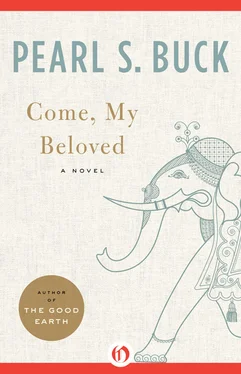“All that I have is Thine—”
The echoes lingered, and after an instant he struck the bell on the desk harshly. A middle-aged man came in, his secretary. He had never taken to the fad of having a woman in his office, he did not think women should be in business, certainly he did not want a strange woman near him now.
“Thomas, see if Dr. Barton is at home and ask him if he will lunch with me today at one o’clock?”
“Yes, sir,” the man replied.
He went away and returned in a few minutes, noticing no difference in the grizzled figure at the desk. “Dr. Barton will be delighted, Mr. MacArd. Shall I give orders for the small dining room?”
“Yes,” MacArd said. When he was alone he had a tray brought him from the kitchen suite on the top floor. When he had a business conference he ordered luncheon in the paneled dining room, but there was also a small glass-enclosed room on the roof, from where one could look out over the river and see the ocean far beyond. Only a most intimate associate ever lunched with him there, and sometimes Leila had come to dine with him on days when he could not leave the office at night. Together they had eaten and drank, and then for a few minutes, before he went back to his desk and she went home, he always turned off the lights so that she could see the dazzling city spread before her.
“All yours, my sweet, my queen,” he used to say. “Yours, if you want it, to play with or to weave in a necklace or in your hair.”
He had not used the room since she died. Now, when Thomas was gone, he threw down his pen and whirled his desk chair to face the wide window at his back. There gazing over the roof tops into the mild blue sky he reflected upon what it might cost him to acknowledge the full meaning of the words that an hour ago had been torn from his own lips.
Dr. Barton listened respectfully to this richest man in his congregation. He was not a coward and had he felt it his duty he could have spoken plainly even to the great MacArd. Fortunately it was not likely that such would ever be his duty. MacArd was a man rigidly respectable, without grace, perhaps, but good, and if there were rumors of his ruthlessness in business, Dr. Barton supposed that a certain amount of that harsh quality was necessary for success. Caesar had qualities which did not belong to Christ, but which nevertheless were entirely suitable to Caesar.
“It is a stupendous idea, Mr. MacArd,” Dr. Barton said with profound feeling.
He had enjoyed the luncheon, the dishes were prepared with perfection, and he had tried to check his appetite. MacArd ate with careless speed, accustomed doubtless to such food, but it was a feast even for a minister as well placed as Dr. Barton. He knew that gluttony was the vice into which many men like himself fell, and he struggled continually against it. A fat man of God, a voluptuous priest, was repulsive if not actually sinful, and he did not deceive himself. Gluttony was also a sensual vice.
“You like it?” MacArd demanded. “You see the need?”
“It is an idea worthy of your managerial genius,” Dr. Barton replied.
“It is the fruit of my trip to India,” MacArd replied. “The Indians need a decent religion, a creed that will make men of them instead of supine animals. Practical Christianity is the answer, Barton, a vital, missionary creed that will destroy their idols, clean out their vile temples, and give them energy. I say India, but I mean the world. I want to establish a center of virile Christian training from which men will go out into all the world, preaching a gospel of faith and works. I shall make it a memorial to my beloved wife. I want it called the Leila MacArd School of Theology. I want the standards to be the highest and the men to be of the best. I want you to help me find the right place for it and then choose the best men in the country for the faculty. When a man says he is a graduate of MacArd, it must mean that he is a man of natural technical ability trained to the highest degree to spread the gospel of Christianity.”
A waiter came in noiselessly to remove the plates and the butler served the dessert, a creamy ice and small cakes and hot coffee. MacArd pushed his dish away.
“Bring me apple pie and cheese,” he ordered.
“Yes, sir,” the butler replied, and taking the dish away he was back again with a quarter of apple pie, while the waiter presented a tray of various cheeses.
MacArd pointed to a sharp Norwegian cheese and talked on rapidly while the waiter served him.
“First the place,” he proclaimed, “then architects to design the finest possible buildings.”
Dr. Barton was overcome. “Do you have any financial figure in mind, Mr. MacArd?”
“I am not thinking in figures,” MacArd replied. “I am thinking only of achievement.”
“Admirable,” Dr. Barton murmured. “It is quite possible that the world will be changed as a result of what you do.”
He ate his cream ice thoughtfully and nibbled a cake. He hoped that he was not thinking of himself, he earnestly strove not to do so, but it was quite possible that Mr. MacArd would offer him the position as the first President of the MacArd School of Theology. It was of course to be a memorial to Mrs. MacArd, but inevitably it would be known as the MacArd School. She would have been the first to recognize that necessity. He remembered her as a slender tall woman, always gracious, and disturbing only because one was not quite sure whether she was about to laugh. Sometimes when he was preaching with the utmost sincerity he had chanced to look down upon her in the MacArd pew, the central front pew, and he met her eyes fixed upon him and he had caught in them the brightness of laughter. He had learned not to look at her in church.
MacArd tapped the tablecloth with his large fingers. Bunches of red hair shone between the knuckles.
“Well,” he said briskly. “I guess that’s all, Barton. You have your job cut out for you. You can have any help you need here at the office, leg men and so on.”
“Thank you,” Dr. Barton said. “I prefer to do some preliminary reconnoitering myself, if you don’t mind. We don’t want to duplicate existing conditions.”
“There doesn’t exist such an institution as I plan,” MacArd said heartily. “It is something unique, something great, a center of missionary force, MacArd men must know it is their duty to go into all the world, not settle down in some comfortable pulpit here at home.”
Dr. Barton tried to be humorous. “I trust you are not speaking of me.”
“Of course not,” MacArd replied. “Our churches have to be supplied. Besides, you are not a young man. It is the young who must undertake the sort of thing I have in mind.”
Dr. Barton was relieved. He rose, conscious of an atmosphere thickening with impatience.
“I shall let you bear from me in a very few days, Mr. MacArd,” he said. He rose, a pleasantly rotund figure, and shook hands warmly with his chief parishioner and went away.
Summer crept over the city in a mist of heat. Great houses along the Avenue were closed and the families went away to Bar Harbor, to Newport and the coasts of New England. In other years David had gone with his mother to a quiet beach in Maine that faced the south because of the curving bay. This year as a matter of course he stayed on in the city, breakfasting each morning with his father and he was there at night to dine with him when he came home. He knew that his father worried about him intermittently between bouts of work, and he endeavored freshly every day to be cheerful and sympathetic, ready to listen to whatever his father chose to tell him. It did not occur to him to share his own thoughts or feelings, not only because he had never done so, but because there was nothing, he would have said, to share. He was not unhappy, the loneliness for his mother had settled into a dreamy melancholy and he spent his days in a continuing peace which he knew was only an interval. Some time soon he must make up his mind about what he wanted to be. One thing he knew, that he would not go into his father’s offices, but this was not expected of him. So much his mother had done for him during the years she had made it quite plain that David was not like his father and must not be expected to follow in those immense footsteps.
Читать дальше












